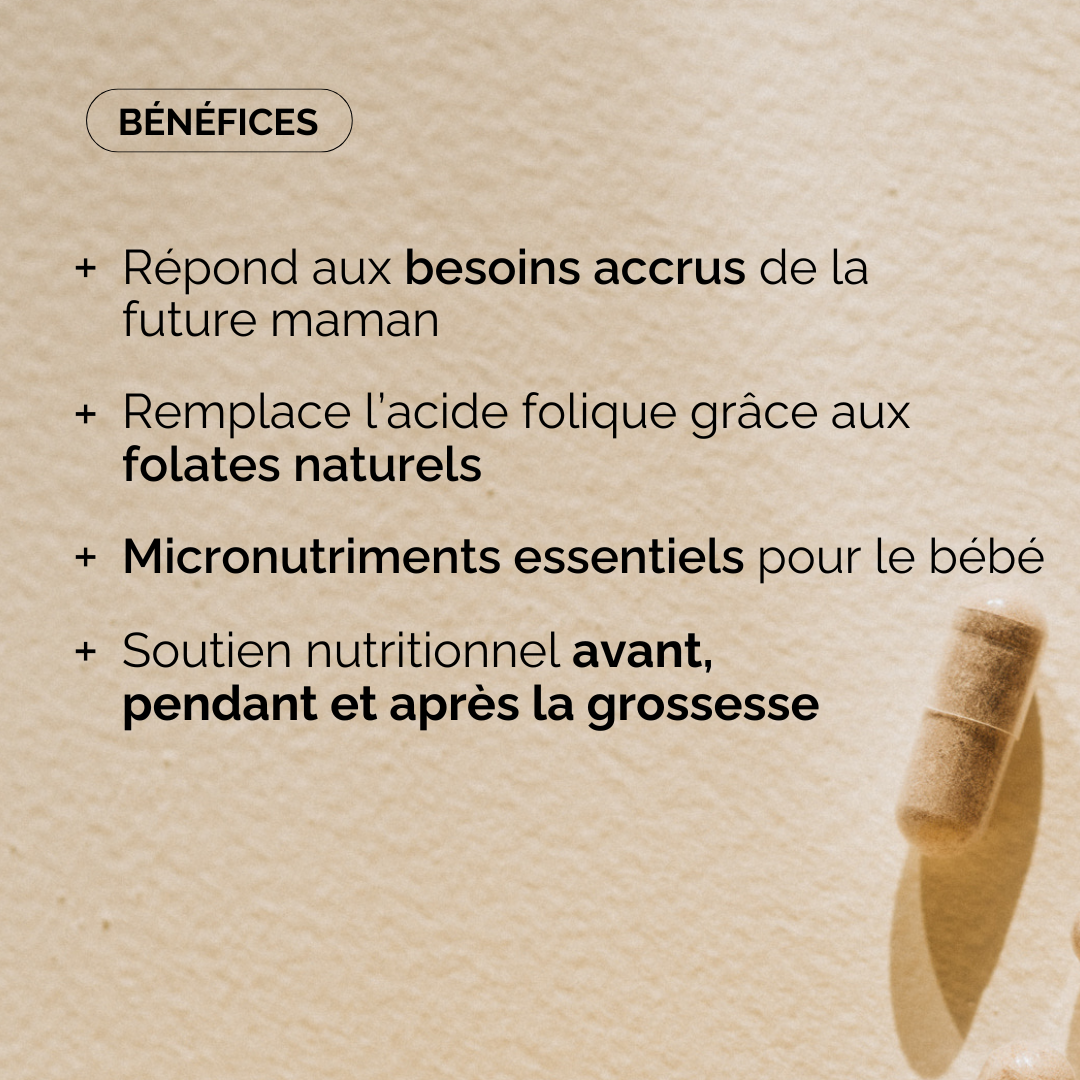
That's it, you're entering the famous second trimester of pregnancy, often described as the "honeymoon" for expectant mothers. Goodbye nausea and extreme fatigue, hello renewed energy and a rounding belly! But beyond the relative comfort, it's also an important time for your baby's development. What should you watch for? What prenatal exams should you have? And most importantly, how is that little being inside you growing? Our article explains everything!
The 2nd trimester of pregnancy: dates and symptoms
The second trimester of pregnancy is generally the most enjoyable time of the adventure. The body has adapted, and the expectant mother feels a certain boost of energy.
When does the second trimester of pregnancy begin?
The second trimester of pregnancy begins at the 14th week of amenorrhea and ends at the 27th week. This corresponds to the 12th and 24th weeks of pregnancy, or from the beginning of the 4th month of pregnancy to the end of the 6th month of pregnancy! Your baby is entering a phase of rapid development. Your uterus is growing, as is your belly. And the risk of miscarriage is radically reduced. You finally feel free to say " I'm pregnant " to anyone who will listen! This is the beginning of a more peaceful period, where you can fully enjoy your pregnancy.
What to expect in the second trimester of pregnancy as a mother?
In the second trimester, joy: most of the ailments of the first trimester of pregnancy disappear. Goodbye morning sickness, goodbye intense fatigue! You probably feel a surge of energy and the desire to resume activities you had put on hold. Your unborn baby is taking up more and more space, your pregnancy is becoming visible.
However, some physical changes may occur, such as:
- Stretch marks on your stomach, breasts or thighs: if they bother you, remember to moisturize your skin well to limit them as much as possible, with products specially designed for pregnancy .
- The famous pregnancy mask: linked to hormones, it is a hyperpigmentation of the face that will fade after childbirth.
Although this period is more gentle for most pregnant women, some symptoms may persist (or occur). For example:
- back pain, more frequent due to the increasing weight of the uterus;
- leg cramps, which can occur at night.
However, if you experience severe pain, or notice gynecological bleeding in the second trimester , listen to these signs, and consult your midwife without delay.
How does the embryo grow during the second trimester of pregnancy?
From the 12th week of pregnancy, the fetus undergoes dramatic changes. From the first sucks to the first movements... Each week brings its share of development!
Week 14 to 17
Week 14: Sucking and Swallowing
At 14 weeks, your unborn baby begins to develop sucking and swallowing reflexes. They strengthen their mouth muscles and prepare for breastfeeding or bottle feeding.
Week 15: First movements
During the 15th week, your baby becomes more active. And even if the expectant mother doesn't necessarily feel his first movements yet, he's already moving inside the uterus. His joints become more mobile, allowing him to flex his arms and legs.
Week 16: Fine hair
In this 16th week, your baby's first hair (or "lanugo") begins to grow. This is a fine downy layer that covers the baby's body to protect it. These tiny hairs will disappear at birth—in the meantime, they help the fetus maintain a proper body temperature.
Week 17: Baby is more agile
At the 17th week of pregnancy, your baby is becoming increasingly agile. He now has better coordination and his movements are becoming more fluid. He is now able to turn his head and move his limbs more.
Week 18 to 21
Week 18: Boy or girl?
During the 18th week of pregnancy, you'll likely have a morphological ultrasound. Want to know the baby's sex? Now's the time! Their genitals are already sufficiently developed to be visible. This is a milestone often eagerly awaited by parents, which also allows the sonographer to ensure good fetal health.
Week 19: His senses are heightened
At the 19th week, your baby's senses are refining: the parts of his brain related to taste, hearing, sight, and touch are developing at a rapid pace. The size of his head is becoming proportional to the rest of his body.
Week 20: You can feel it moving
From the 20th week, you can finally feel your baby moving. These first little kicks, usually referred to as "bubbles," are an exciting moment for the pregnant woman. That's it: your baby has grown enough for their movements to be felt.
Week 21: Baby plays with hands and feet
During the 21st week, your baby becomes very active, a real little athlete. He begins to explore his environment. He can now touch his face and grab his feet. He moves his arms and legs in a more coordinated manner, and continues to stretch and roll over.
Week 22 to 25
Week 22: Baby responds to sounds
At 22 weeks, your baby's ears are fully formed, and they can now respond to sounds. If you talk to them or play music, keep an eye out: they may roll over or move in response! This is also a time when they begin to recognize familiar voices, especially their mother's.
Week 23: Eye Opening
Your baby will be practicing opening and closing their eyes for the first time starting around week 23. Their irises aren't pigmented yet, but they're slowly developing.
Week 24: Her real hair is coming in
This is the "real" hair! In this 24th week, it begins to grow on your baby's head, gradually replacing the fine down that covered his scalp. However, it is not yet colored. During this time, the fetus continues to gain weight and grow.
Week 25: Baby hears you
By week 25, your baby's hearing is well developed. It's now clear: they can hear external sounds, like your heartbeat or your voice. Some babies may even react to loud sounds by jumping! If you haven't already, this is a great time to start talking to them and bonding even before they're born.
What tests and preparations should be done during the second trimester of pregnancy?
In the second trimester, expectant mothers must undergo several medical examinations to prepare for the arrival of their baby and thus limit the risk of premature delivery. Rest assured: these are all covered by Social Security.
T2 ultrasound
The second ultrasound, or morphological ultrasound, is generally performed between the 22nd and 26th week. This allows:
- to check your baby's development;
- to assess the amount of amniotic fluid;
- to detect possible anomalies;
- to know the sex of the baby (if you wish).
In short, it is an important time to monitor the proper growth of the fetus.
Looking for a little extra help to stay in top shape during your pregnancy? Our pregnancy vitamins will become your best friend!
Screening for gestational diabetes and toxoplasmosis
Gestational diabetes screening can be performed between the 24th and 28th weeks of pregnancy. It helps monitor the blood sugar levels of expectant mothers. If you are not immune to toxoplasmosis, you will also need to be tested monthly to avoid any risk to your baby.
Whooping cough vaccine and immunoglobulin injection
According to the Ministry of Health and Prevention , it is strongly recommended to get vaccinated against whooping cough in the second trimester. If your blood type is Rh negative, you will probably also need to receive an immunoglobulin injection. This will prevent complications related to blood incompatibility with your baby.
Childbirth preparation classes
From the second trimester of pregnancy, you can benefit from childbirth preparation sessions. They will help you:
- to better understand the different stages of childbirth;
- to learn breathing and relaxation techniques;
- to prepare for the big day calmly.
It's also a great way to ask any questions you may have... So take advantage of it!
The second trimester of pregnancy is a pivotal time, full of changes and discoveries, both for you and your baby. This more serene phase is also an opportunity to calmly prepare for the third trimester of pregnancy and childbirth... and welcome your little one in the best possible conditions. Tick, tock: each step brings you a little closer to this big moment!










